Rise Above Read online
Rise above
by A M Kirkby
Text Copyright © 2012 A M Kirkby
All Rights Reserved
This book is a work of fiction. Names, characters, events, and locations are fictitious or are used fictitiously. Any resemblance to actual persons or events, living or dead, are entirely coincidental.
This file is licensed for private individual entertainment only. The book contained herein constitutes a copyrighted work and may not be reproduced, stored in or introduced into an information retrieval system or transmitted in any form or by any means (electrical, mechanical, photographic, audio recording, or otherwise) for any reason (excepting the uses permitted to the licensee by copyright law under terms of fair use) without the specific written permission of the author.
Short stories
A Ghost Story of the Norfolk Broads
The Tin Heart
Sword of Sorcery
Sacrifices
Egerius
Wake the dragon
Novellas
Walsingham Way
Green Land
Doppelgänger
Novels
Etruscan Spring – forthcoming
Etruscan Blood - forthcoming
Children's books
Kasbah cat
Pagliaccio the opera cat
Rise above
a novella
by A M Kirkby
He let the trigger go. He heard the string thrum, felt the jolt of the crossbow cradled in his arms. His eyes almost shut, as if he were praying.
The air seemed to flex with the deep hum of the bowstring slowly vibrating back to stillness.
He kept his eyes shut a moment, and his lips moved silently.
"Christ's wounds!" someone was yelling. The moment of stillness was gone, as it always was once the bolt had been shot. The forest full of noise. People running towards the body, as they always did. Now came the business of gralloching the kill; the butchery began.
But they were still yelling, and there were others coming towards him, running, stumbling on the tussocks of grass, on the uneven ground. They were surrounding him; for a moment Tobias felt like a fox at the end of a chase, watching the hounds close in. He saw mouths opening and closing, and couldn't make any sense of what they were saying. Slow on the uptake, as ever.
"... a terrible accident..." one of them said, and he grabbed on to that thought and held it, as one of the russet-clad servants reached gently for the bow and took it from him. He felt another reach an arm across his back, gently gathering him up, turning him away from the body in the clearing, walking him away.
He wished he could feel that hushed stillness again, the moment before the trigger had suddenly jolted back under his finger. The still small voice that he had once heard. The peace of a good conscience.
May God forgive me.
***
They were all met in the great chamber, the men in black; their long robes dragging, pale faces above stiff white ruffs, below that black caps, like copies of a single pattern. One with a ginger goatee, and squinting dark eyes; another with a long, greying beard, and friendly moist eyes that seemed to slant down at the outside, as if his face were so tired it was gradually collapsing.
He couldn't count them, they clustered so thickly, but he tallied up his friends. Old Chamberlin, that was one, the greybeard; and Trefusis of Bath and Wells, and his brother Robert; who hadn't always been on his side, in theological disputation or in the governance of the Church, but who none the less would be a faithful friend now, he could depend on it. Bastwick of Christ Church, fat with good college living, his forehead damp as his handshake; dependable, usually.
But there were enemies too; Prynne and Nix, both with wry mouths as if they had just drunk sour wine. Prynne was an ass, he thought; Nix, clever, though wrong. Nix at least disagreed with him for a good reason, believing freedom of conscience was more important than regulation of belief; though if you took Nix's line, eventually you would have to dispense with the Church entirely, yet Nix didn't seem to think there was any contradiction between holding such views and holding down a bishopric, particularly not a lucrative one like Salisbury. As for Prynne, he'd never forgiven the fact that he was passed over for Canterbury, in favour of Tobias; Nix might vote according to his conscience, on this matter, but Prynne would vote as his hatred counselled him.
And there was Prey, the youngest of them, sharp with ambition and temper; it was true what they said about red-heads, he thought. Prey, with his high society friends and his easy theological tolerances.
Four on his side, three against, and then the others, Bateman and Honest-to-God Fuller and Waddington and Fox and Smith, his colleagues and his judges. All would be decided today, at the long table in this dim oak-panelled room, by the bishops of the realm meeting in council.
For a moment, as he looked at them, he felt himself not part of the company at all, though he knew to any other eye he'd look just the same, in his crow-like black. They seemed uncertain; muttered or whispered conversations started, trailed off, the words inaudible. No one spoke to him; even his brother, perhaps to prove his impartiality to the others, merely met his eye, and shook his head once, sadly, and then his eyes glanced away again.
There was a single chair this side of the table; fourteen the other. Tobias looked out of the window, to the cold light of a London winter. The fig tree was skeletal, bare of leaves; the breeze shivered the waters of the fountain. He caught a flicker of his reflection in the glass; strange how a moment ago he couldn't see it, but now he could see nothing else in the grey glass but his own face, weak and unresolved. Suddenly, the room behind him was silent.
A little, bent man entered, leaning on the arm of a much younger, tall, straight one. He was dressed entirely in dark brown, as if to complement the serious black of the bishops' robes without appearing to join them; but the several gold rings and the massy golden chain round his neck belied his attempt at humility. The other man blazed in orange and russet, which almost concealed the fact that he was wearing as much if not more gold jewellery; a black pearl gleamed in one ear.
The king settled himself in the central chair, shifting his weight from one buttock to the other till he was quite comfortable; and even then, he shrugged his shoulders irritably as if something were scratching him. Next to him, the young man sprawled, his long legs stuck out in front of him, having pushed his chair far back; he tipped his head back, and looked out under half-closed eyelids down his fine nose.
"Tobias Prior," the king said, his face grave but his voice too high, quavering slightly. "We are met to determine whether you may continue as archbishop."
"I thought we were met to put him out of office," Prynne muttered. Nix raised one eyebrow; Bateman sat up, and nudged the bishop next to him sharply, though he said nothing.
The King called for Prey to outline the argument. This was bad news, Tobias thought, but not the worst; Prey was not his friend, but he was not a declared enemy. It might have been Prynne.
There was not one line of argument, but several. The archbishop might have killed the gamekeeper deliberately; that was murder, and would disqualify him for office. It would expose him to trial in the criminal courts, too, even though the local magistrate had held that there was no case for prosecution. But Prey did not insist on this; he must have realised that even those bishops who wanted Prior's place – perhaps with the single exception of Prynne – would never vote for an archbishop to be tried for murder.
Instead, he said, it might be held that the archbishop had committed manslaughter, through negligence rather than his own deliberate fault; but that too wasa crime, and no criminal could retain his office as archbishop. But again, the local magistrate had held that there was no case to answer; and who was he to disagree, a
bishop whose concern was with the ways of God, not man?
That was clever, Tobias thought; Prey had raised those doubts while pretending to dismiss them. And if by any chance the commission found him guiltless, Prey could claim he had never said anything against him. Prey would portray himself as the innocent, wriggling as best he could within the terms of the commission given him by the King to ensure Tobias was cleared. But Tobias well knew Prey could wriggle either way, like a snake in a trap.
Then Prey surprised him.
"No," he said; "the death was an accident. The archbishop deserves our pity, not our scorn. Our pity for the knowledge he must bear with him that he has killed a man, however inadvertently; for his sorrow at the death of another at his hands. Our pity for the prayers he must have offered up, that are between him and the Almighty. I look at him across the table now, and I see a man broken by sorrow and distracted by his grief."
Prey's voice was low, with the catch in it that always came with tears. Tobias felt his own eyes beginning to moisten, and blinked twice, hard. Then he wondered; what is Prey up to? He looked across the table. Nix and Prior were looking furious; Bateman was looking at him with pity, his eyes wide as only old eyes, and those of babies, can be.
"But we have to decide not whether the archbishop is guilty of murder. Or of manslaughter. Or whether he is quite simply unlucky. What we have to decide is whether he committed an error of... of taste, an error of judgment. Whether it is desirable for an archbishop to wield a weapon, for an archbishop to join the chase, for an archbishop to forsake his scholarly occupation for the rough company of the hunting field."
"Mmmm, rhetoric," Waddington murmured. But Nix, his mouth tight, said: "Pompous."
"The archbishop's comportment has been called in question, not his culpability. That is, of course, why I called this council," the king said. Tobias thought he saw Prey's face twitch in anger; dangerous, to show such irritation, he thought, even though the king could not have seen it, Prey's face being turned slightly away.
"Continue, bishop."
Prey did not continue immediately, but stood pensive, his eyes downcast. Slowly, he bowed his head, and as slowly raised it, and looked to one end of the table, and to the other. Only then did he speak.
"It is with great regret" – almost as if he was announcing a death – "it is with great personal regret that I must pursue this line of argument. I cannot find it in me to condemn the archbishop; but we must consider the good of the church. We must ask whether hunting is an unsuitable occupation for the leader of the church; not whether he should have been more careful with his bow, or more alert, or less ready with his trigger, but whether he should have been there at all."
So it was not, as Tobias had thought, a court convened on a charge of murder or manslaughter; his enemies had given themselves a much easier task.
Bateman queried whether there was any direct authority in the Scriptures to prevent a priest from joining in the hunt; there was not. For a moment the balance swung in Tobias' favour. But then Fuller pointed out that Leviticus demanded a priest be physically perfect, and ritually clean; that he might not even pollute himself with mourning for his parents or his wife, and how much more damaging was the fact that he had been himself the instrument of death. Tobias' fate was again in the balance, and there was nothing he could do but wait; he had not even been invited to speak. He was present only in the way the corpse is there at a state funeral; an image, an effigy. People spoke of him, but not to him; his brother avoided his eye.
Chamberlin coughed hesitantly. Prey turned to him and waited for the old man to speak.
"I don't know, I really don't know, but... accidents of this sort, hunting accidents, fatal or perhaps sometimes not; are they common?"
"What is the relevance of the question?" Prynne asked testily, but Prey held his hand up in warning.
"I merely thought, if such accidents often occur, then perhaps our archbishop should not have exposed himself to such a dangerous pursuit. But then, if they are not commonly met with, he would have had no thought for that possibility, and perhaps we should allow him the benefit of the doubt, as he could not have..."
Chamberlin's voice tailed off, as if he'd lost himself somewhere in the meandering thought of that sentence. His beard quivered a couple of times, as if he was weeping, or chewing something secretly.
"Let us move on," said Prynne. Prey glared at him; no wonder, Tobias thought, for Prynne was taking on himself the management of the tribunal which had been awarded to the other man.
"Let us move on, those of us still in possession of our faculties."
Tobias frowned at the insult, but Chamberlin hadn't even noticed.
"We are here to judge the archbishop's conduct. Whether he could or should have expected an accident, whether he could or should have refrained from shooting till the target was clear, whether he meant to shoot or not, is quite irrelevant. We only need to judge whether it is seemly for an archbishop to join the hunt, and I say not. It was a gross error of judgment, the kind of error to which Tobias Prior seems rather too prone."
Prey was on his feet again now, trying to speak, but Prynne was talking over the top of him; Bastwick had raised his voice, saying "no, no, that's not..." but never quite managing to get his sentence out; and the King sat watching, absently fondling the hair of the young man next to him.
This is bad, Tobias thought. He didn't recognise himself in Prynne's image of him; the reckless, hasty man who took decisions in an instant, who jumped into things with both feet, who rode like Jehu and indulged in the wild hunt. Yet at the back of what Prynne said, there was one truth; he had never known what people thought of him, never really understood how he was seen. He didn't possess Prey's unerring instinct for self-presentation. But that made him doubtful of everything; a man who thought, perhaps too much, before taking action; who was unsure, who reasoned his way through life like a man walking on river ice, testing his weight, never taking a step till he'd shifted his weight and felt the surface firm. Not the reckless man Prynne portrayed. Yet in the end, he thought, as uncertain, as prone to take the wrong decision through too much thought rather than too little.
His thoughts had drifted away; his eyes were dazzling with the light, as he realised he'd let them become unfocused. He blinked, looked again at the men round the table. Apart from Prynne with his keen and angry face, they might as well have been carved out of wood. The king's face showed his distaste; the whole room seemed frozen. Only the king's young assistant was intent on piling a small pyramid of snuff on the inside of his curled thumb, prodding the powder into shape with a fingernail.
There were more questions; others spoke. He heard only drifting phrases; "unfit for his office"; "blameless, although..."; "worldly pursuits"; "low-born companions"; "unseemly if innocent". He let his eyelids droop. Jamie, he thought, Jamie; they never mentioned his name.
Enemies, friends, independents; he knew the mathematics, he knew the combinations. It was finely balanced. If he won one bishop's vote, he might lose another's; he couldn't rely on anyone. Even his brother might vote against him; Robert had continued to evade his eyes. Robert, the younger, cleverer brother. It had been Robert who stood for freedom of conscience and the independence of the church when Tobias had been struggling to find any solution that could unite the Scottish and English churches. Robert who had avoided the defiling touch of compromise and equivocation. Robert who might be in line to succeed to Canterbury if his brother fell from grace.
He remembered, in the immediate aftermath of the incident, how he'd looked to Robert for comfort; but Robert gave him none.
"Your grief is excessive," he'd said.
"I've killed a man."
"But not by your own deliberate fault. You must not grieve as if it were."
"A man is dead."
"A huntsman, an outdoors servant. A very ordinary man."
"He was dear to me."
"Of course. It is a shock when someone dies in the household, I understand
that. But you must not grieve so deeply, Tobias; you must not."
Robert knew what to do, of course; Robert always did. Robert who, unlike Tobias, had become a parish priest, a father, an archdeacon, while Tobias stayed in the shelter of his college's courts, a scholar who, when translated to the bishopric, blinked in the unaccustomed light. Robert who would never have killed a man.
Prynne was speaking again, his voice rising; "a murderer," he said, "a killer," and suddenly there were many voices, some coldly disapproving, others shouting against him. Nix, who he'd never thought a friend, shouted loudly, and then rose to his feet in the sudden silence, and said; "Whatever else he may be, Tobias Prior is no murderer, and you know it."
They voted, secretly, each bishop writing his verdict on a slip of paper, which the King's young man collected. He went back to his seat and looked through them, shuffling them in his hands, not putting any on the table in front of him; his hands hid the writing from view. He was as casual as if he were dealing cards. He smiled to himself, a secret little feline smile, and bent to murmur to the king, and as he did so crumpled the papers together in his left hand. The king bent towards him, nodded, and spoke.
"There are six votes against the archbishop. Six in favour."
Everyone was looking at someone else; everyone was wondering who had voted which way, who might change their minds on a second vote, whether Tobias would step down. A tied vote would not clear him; the bishops had lost confidence.
Suddenly, the king grasped the edge of the table; he was trying to stand, but it wasn't till the youth beside him bent to assist him that he was able to. He grimaced as he rose; he must have had cramps. He's grown old, Tobias thought, and then he realised they had all grown old, every one of them around their table, except foxy Prey and sweaty Bastwick.
The casting vote belonged to the king; and it was the king who had convened the court. Tobias knew he would have to resign; but now that the king was starting to speak, he could no longer do so of his own volition – he would be asked to quit, and that would shame him for ever. He cursed the slowness that had kept him back from offering his resignation in that moment after the vote was read out, before the king had made his decision.
"Tobias Prior." The king called him, and he stood, clasping his two hands so that no one could see how they shook.
"Tobias Prior, your peers are evenly divided. It falls to me to decide whether or not you should continue as archbishop.
"It seems to me there is …" he coughed, and began to choke, his shoulders convulsing, till his assistant handed him a handkerchief into which he spat. When he started to speak again, Tobias saw his lips were smeared with blood.
"There is no reason why you should not continue in your position."

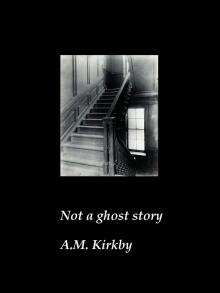 Not a Ghost Story
Not a Ghost Story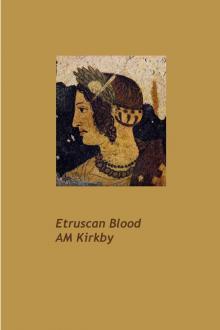 Etruscan Blood
Etruscan Blood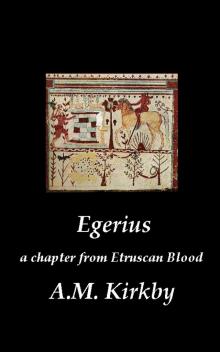 Egerius
Egerius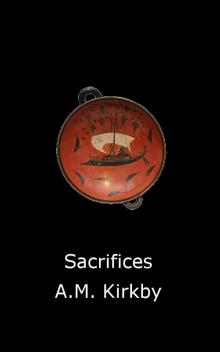 Sacrifices
Sacrifices The Tin Heart
The Tin Heart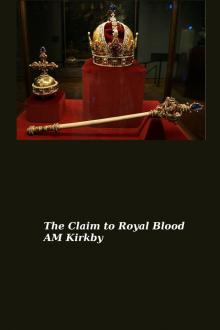 The Claim to Royal Blood
The Claim to Royal Blood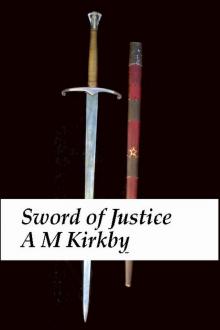 Sword of Justice
Sword of Justice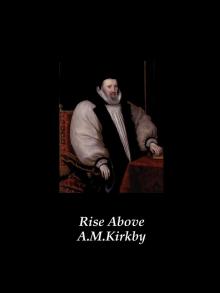 Rise Above
Rise Above